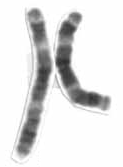3q29 Microdeletion Syndrome

3q29 microdeletion syndrome is a rare chromosome disorder. Symptoms may include delay reaching some developmental milestones such as sitting, walking or talking, frequent ear and respiratory infections, and a small head size (microcephaly). Some babies with this condition are born with a cleft lip or cleft palate, and a few have been reported to have heart defects. As children with this condition get older, they may develop behavioral difficulties such as autism, and they may have symptoms of mental illness. The severity of symptoms can vary, and some people with 3q29 microdeletion syndrome may have very mild symptoms or may not even know they are affected.
3q29 microdeletion syndrome is caused by the loss of a small piece of DNA in one copy of chromosome 3, one of the 23 pairs of chromosomes in each cell in our bodies. Most cases of 3q29 microdeletion syndrome are de novo, which means the deletion was not passed down from either parent. Some cases may be inherited from a parent who is only mildly affected by the condition.
Diagnosis of 3q29 microdeletion syndrome may be suspected by symptoms but is confirmed by genetic testing. Treatment is based on signs and symptoms of each person and may include surgeries to repair any physical abnormalities, speech therapy, behavior therapy and special education.
3q29 microdeletion syndrome is caused by the loss of a small piece of DNA in one copy of chromosome 3, one of the 23 pairs of chromosomes in each cell in our bodies. Most cases of 3q29 microdeletion syndrome are de novo, which means the deletion was not passed down from either parent. Some cases may be inherited from a parent who is only mildly affected by the condition.
Diagnosis of 3q29 microdeletion syndrome may be suspected by symptoms but is confirmed by genetic testing. Treatment is based on signs and symptoms of each person and may include surgeries to repair any physical abnormalities, speech therapy, behavior therapy and special education.